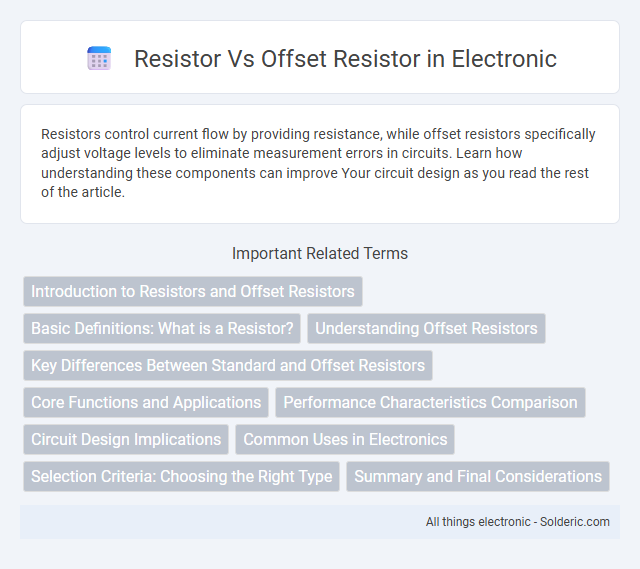Resistors control current flow by providing resistance, while offset resistors specifically adjust voltage levels to eliminate measurement errors in circuits. Learn how understanding these components can improve Your circuit design as you read the rest of the article.
Comparison Table
| Feature | Resistor | Offset Resistor |
|---|---|---|
| Definition | Passive electrical component providing resistance in a circuit. | Resistor specifically used to create a voltage shift (offset) in circuits. |
| Primary Use | Limits current and divides voltage. | Introduces precise voltage offset for signal adjustment. |
| Function | Reduces current flow and controls voltage. | Offsets signal baseline to correct or shift voltage levels. |
| Application | Universal use in circuits for current and voltage control. | Used in amplifiers, sensors, and signal conditioning circuits. |
| Value Selection | Chosen based on resistance required (ohms). | Selected to provide specific voltage offset magnitude. |
| Impact on Signal | Does not intentionally alter signal baseline. | Purposefully shifts signal voltage level. |
Introduction to Resistors and Offset Resistors
Resistors regulate electrical current by providing a precise amount of resistance within a circuit, crucial for controlling voltage and protecting components. Offset resistors are specialized resistors designed to introduce a deliberate voltage offset, enabling fine-tuning of signal levels in sensitive electronic systems. Understanding the differences between these components helps you optimize circuit performance and accuracy.
Basic Definitions: What is a Resistor?
A resistor is an electronic component designed to limit or regulate the flow of electric current in a circuit by providing resistance measured in ohms. Unlike a standard resistor, an offset resistor is specifically used to adjust or shift voltage levels within a circuit to achieve desired output characteristics. Both components play crucial roles in controlling current and voltage but serve different purposes depending on circuit requirements.
Understanding Offset Resistors
Offset resistors are specialized resistors designed to introduce a deliberate small voltage offset within electronic circuits, enhancing signal accuracy by compensating for inherent system errors. Unlike standard resistors that primarily limit current and divide voltage, offset resistors are often used in precision applications such as operational amplifier offset nulling and sensor calibration. Understanding offset resistors involves recognizing their role in minimizing measurement errors and improving overall circuit performance by ensuring voltage levels are accurately aligned.
Key Differences Between Standard and Offset Resistors
Standard resistors provide a fixed resistance value used to limit current and divide voltage in electronic circuits, maintaining precise electrical performance. Offset resistors include a deliberate resistance deviation to compensate for specific circuit conditions, such as temperature variations or signal offsets, enhancing accuracy in analog signal processing. Key differences lie in their design purpose and application: standard resistors offer consistent resistance, while offset resistors are tailored to adjust baseline voltage or current levels for precise calibration.
Core Functions and Applications
Resistors primarily regulate current flow and divide voltage in electronic circuits by providing a precise resistance value. Offset resistors, a specialized type, introduce a deliberate voltage offset to adjust signal levels or balance inputs in sensitive applications such as amplifiers and sensors. These components are essential in fine-tuning circuit performance, ensuring accurate measurements, and stabilizing electronic signals in various industrial and consumer electronics.
Performance Characteristics Comparison
Resistors exhibit stable resistance values with low temperature coefficients, essential for predictable circuit behavior, while offset resistors are specifically designed to introduce precise voltage offsets with minimal noise and drift. Standard resistors prioritize linearity and power rating, whereas offset resistors emphasize fine-tuned voltage adjustments and improved signal integrity in sensitive applications. The performance differences are critical in precision measurement systems where offset resistors support enhanced accuracy by compensating for inherent circuit deviations.
Circuit Design Implications
In circuit design, standard resistors control current flow and voltage levels, ensuring stable operation across components. Offset resistors introduce deliberate voltage offsets, enabling fine-tuning of signal baselines or sensor calibration for precise measurements. Using an offset resistor can optimize your circuit's performance by minimizing error margins and enhancing signal accuracy in sensitive electronic applications.
Common Uses in Electronics
Resistors are commonly used in electronic circuits to limit current, divide voltages, and protect components by providing precise resistance values. Offset resistors, a specialized type, are primarily utilized in sensor calibration circuits and operational amplifier offset voltage adjustment to enhance measurement accuracy. Both play crucial roles in stabilizing circuit performance and ensuring signal integrity across various electronic applications.
Selection Criteria: Choosing the Right Type
Selecting the right resistor type depends on factors such as tolerance, temperature coefficient, and application requirements. Offset resistors are preferred when precise adjustment of offset voltage is needed in circuits, while standard resistors suit general current limiting and voltage division tasks. Your choice should align with the performance demands and accuracy needed for optimal circuit functionality.
Summary and Final Considerations
Resistors control electric current and voltage in circuits, while offset resistors fine-tune signal levels to correct deviations or biases. In precision analog design, offset resistors enhance measurement accuracy by minimizing offset voltage errors more effectively than standard resistors alone. Selecting accurate offset resistors with low temperature coefficients is crucial for reliable and stable performance in sensitive electronic applications.
resistor vs offset resistor Infographic

 solderic.com
solderic.com